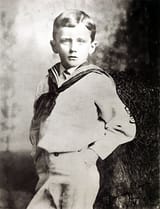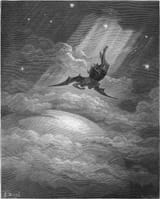
I
In three sections. The first section is vague impressionistic childhood memories. A moment later, he's shipped off to school, cruelly separated from his parents. Some kid pushes him into a ditch, he gets sick, and he spends time in the infirmary. He does NOT tattle, or "peach" on the fellow who did it, as his father advised him not to. This probably works out to his advantage, he's a regular guy now. There is a rhythm of going off to school for a semester, then going back home for a bit, and this will repeat over years.
Second section: political argument around Christmas (not Thanksgiving, that's for Americans) turkey. (Turkeys were imported to Ireland???) Legible for an American reader. Stephen's dad and one or two other guys defend Parnell, Dante is the crazy aunt (initially seemed cool) who blindly supports the priests. The point here (as far as I'm concerned, at least) is that Stephen's dad has a moral sense which is not blindly tied to the structure of the church.
Third section: back at school. Some intrigue about other, older boys. One suggests that some homosexual activity has occurred, and so either expulsion or flogging will be meted out as punishment. At first it seems like this horrible punishment will happen to others, who may deserve it (they don't). A short time later beatings are administered to the younger boys themselves, who also do not deserve it. One other fellow and Stephen are wrongfully beaten on the palms of their hands by one capricious asshole. Like dad, Stephen is gaining intrinsic, objective-and-subjective, private knowledge that what was done to him was just plain wrong. Priests are human beings, and fallible (Dante doesn't understand this, now Stephen and his dad both do). Try to appeal to a higher authority, in this case, the rector. He is encouraged by all other boys, who saw the wrong done and all its context. He plucks up his courage, enters the rector's office and gets a friendly assurance that the guy who did the beating will be spoken to, and that seems to work. The rector DOES give the guy the benefit of the doubt "oh it must have been a mistake", which should naturally disgust the reader, but the simple fact that Stephen found courage to make the report at all and that it was received well with an (initial) acceptable outcome is the point. On the yard, the other boys ask excitedly and are pleased with the outcome. It is not clear just now whether the intended outcome actually sticks, but Stephen also wisely resolves not to be haughty around the guy either.
Irony: Stephen has "peached" (tattled) on a fellow, just not one of his peers, but a teacher/superior. One difference here is that it was witnessed by several others, so there is that.

II
First brief section: a quick sketch of a summer vacation. Stephen stays briefly in "Blackrock" with relatives, family and a great-uncle. A short time later, some (horse-drawn?) vans come and their things are moved elsewhere. Mom is crying. For the first time, Stephen finds himself in Dublin. The city.
The main shift here is that the narrative voice is maturing. It's still a bit simple, but Stephen is much more rapidly and easily picking up on the essentials, the cues of adult life, and further he senses that he will have to fully participate in it very soon. He understands that dad is in some sort of general (financial, legal etc) trouble, but this is unclear just now, hence the moving. Also, he does not go back to Clongowes as expected. Awareness of sexuality is also indicated as he reads Count of Monte Cristo and during regular walks passes by the house of one "Mercedes".
Now Stephen is a teenager, at some sort of high school as it were, and of an evening there's a combination talent show and school play, or something like that. Various boys and Catholic authority figures busy themselves, get everyone in place. Meanwhile Stephen goes around a back alley and one Heron and another fellow tease him that he's got the hots for a particular girl, presumably the same as above. Heron's features are conveniently described as bird-like, Heron is a bit of a cold jerk. The other boys are a bit dim, but Heron and Stephen are fairly sharp by this point. Stephen is something along the lines of: quiet, aloof, serious. He now has a reputation for writing essays, for being a writer. A while back a priest publicly humiliated him (second time) over a perceived heresy in an essay. Heron got onto this and he and some dim others got talking about literature and the others like Tennyson while Stephen liked Byron, but Heron noted that Tennyson was a damn dirty heretic so they beat Stephen for a while to try to make him recant this position but Stephen didn't give in. Both in the present-tense play-interaction and in the past beating, the word "admit" was the trigger linking both. Now Stephen puts on his makeup for his part in the play, and she is observing it seems.
The memory of Heron's beating doesn't arouse anger, although it should. Something here about boys fighting, and once they've fought, they get on fine with each other, except that's not how it really goes down in this case. They corner him and smack him around a bit, it isn't a fair fight. Stephen is just detached, "above it all", or something like that. Or he wants to feel that he's above it all.
One through-line in all this is that Stephen is learning to be like dad, sort of. Work with the church when you have to, but use your own reason, stick up for yourself. The (un)-friendly interaction with Heron, when Heron seems at all times to be testing Stephen, is an unwelcome premonition of what adult male socializing (competing, dick-waving) must be like.

II (ended)
The above idea is thwarted almost immediately. Stephen accompanies his father on an overnight train to Cork, where they will sell an estate belonging to dad. While in town dad gets very wistful about old memories of the town, and some of the old locals remember him and banter him just a bit, all in good fun. Stephen is in his sullen aloof teenager mode and doesn't really feel like any of these other people, not inwardly. The estate is sold, and a short time later Stephen's skill with writing is beginning to produce tangible rewards: he has won literary/essay prizes adding up to, if I am reading it properly, 33 pounds, nothing to sneeze at in those days. For a brief spell he splurges it on his family and himself, and the money quickly evaporates. Toward the end he is pining for (the) girl again, and a woman approaches him on the street (seemingly a prostitute) and makes a man of him. But was it just there? He also thinks of past "lusts", "orgies" etc, but these may be purely mental processes (or possibly masturbation).
III
The big themes here are teenage lust and (the deeply unfortunate and regrettable) full socialization into catholicism. Stephen walks the streets, knows the details, and the whole nonsense of his education which has been pounded into his brain worries his own brain. The chapter does a clever trick: Stephen goes off into this private mental process, worrying about various theological things, god, damnation, all that, but it isn't actually a priest talking in dialogue: it's his own mind, that stream of consciousness modernism stuff. A short time later, now it IS a priest talking, continuing same subject matter, in DIALOGUE, and here we get the famous and very detailed description of the torments of hell, which occurs right at the halfway point of the book. Around here is also the story of the devil's "Non Serviam" which instantly gets him booted out of heaven, something which is explicitly cited in the rather silly but well-known Scorsese film The Departed. Anyway, Stephen is worried for his soul, and he seeks out a church to confess his whoremongering sins. He feels much better. He has been duped. Importantly, we get one line which gives his age and also a sense of timing up to this point: at this point, he is sixteen.
"Give me the boy until he is seven years old and he is mine for life."

IV
Stephen lives a somewhat pious life, for a time, and it would seem that the Jesuit adults (the managers) take notice. Their programming seems to have worked with this one, maybe we can get him fully on board. He trains himself to endure various minor torments in order to avoid the major torment of hell. He is also given the idea that he should simply endure discomfort in various ways (mortification), or remain uncomfortable: not consciously adjusting one's position in bed, enduring annoying noises, and so on. Eventually, a priest asks him whether he feels that he might have a vocation. Because he's been thorougly socialized into the Jesuit boarding school culture, Stephen honestly notes that it's crossed his mind. But once he thinks seriously about it, the imprisonment of it, his humanity naturally and correctly rebels. "Non Serviam". Since our Stephen has a literary bent, the image of the written phrase "The Reverend Stephen Dedalus, S.J." directly before his mind is a good indication of what he does not want. He has a certain respect for them (noting that he was wrongfully beaten on ONLY(!) two occasions, adding one more-notice how he wrongfully sticks up for and identifies with his abusers here, like a woman), which is not entirely unfounded (they are intelligent and educated, I am sure) but he has enough good sense not to want to be one of them.
Stephen goes home, and we have a concrete picture of his several siblings (Every sperm is sacred, every sperm is great) who are a bit cooped up. And yet, as far as he can tell, they don't resent him as the eldest child (primogeniture). The existence of other siblings has scarcely been acknowledged up to this point, and suddenly there's a cramped room full of them. There's nice lines about how young children are already tired of life, which gives some indication of poverty, or not living quite right. A younger sister uses a pig latin to suggest that the landlord is about to boot them all out. There is also a nice image of the children spontaneously singing together, a good entertainment (music is one of the few departments of life that Joyce doesn't treat with contempt, "pretty airs" and the like are mentioned regularly). And yet somehow, Stephen is shipped off to college.
A short time later, Stephen realizes that he will go to university, and this is very freeing. He senses, incompletely, which is natural for a teenager, that a whole world of possibility is opening up. The final extended image is a solo-ish walk along the beach, interacting briefly with others, observing the sky and the ocean. The scene is simple, and compares with his having escaped both the Jesuit order and also his own home. The scene UNDERLINES the psychological state in a hokey way "walks along the beach" that is still easy to understand: freedom, openness, future. (the early beach-walk scene in Ulysses has a much more blah feel).
V
The family are still quite poor, and in his own home, Stephen is made ready to go off to a day of college. There is very amusing thing about a mad nun screaming JESUS O JESUS inside some secure building, which he can hear as he goes off (the prison/asylum he has just avoided, the prison of the Church. That is, Stephen did well to avoid it).
And here, my old notes break off. I will hit some quick bullets on the last, and longest chapter:
Some guy in the street says silly idealistic things about beind a "democrat" or similar, which compares with the silliness of the petition thing happening inside the school, which Stephen rejects.
The line where Stephen says that he's lost his faith, not his self-respect is funny. It's an anti-protestant sentiment, catholicism has a whole cultic body of intellectual work which buttresses itself. Stephen knows it's all silly but his good misfortune has made it too late for him: he's already been socialized into it so he can never really get clear of it. He's fucked for life. And humans naturally like to feel superior to someone else. Even in exile.
The final bit with Cranly is both sentimental but also true: your mother loves you, just humor your poor mother with the god nonsense, for god's sake. Stephen refuses (and I just made the connection while writing this right now that he's like Icarus in this, fallen son of Daedelus!) The early scene in Ulysses where poor mother is vomiting out her rotting liver in green spew into a white bowl symbolizes Ireland in general, and also cancels out the somewhat hopeful, optimistic sentimentality of these final pages.



